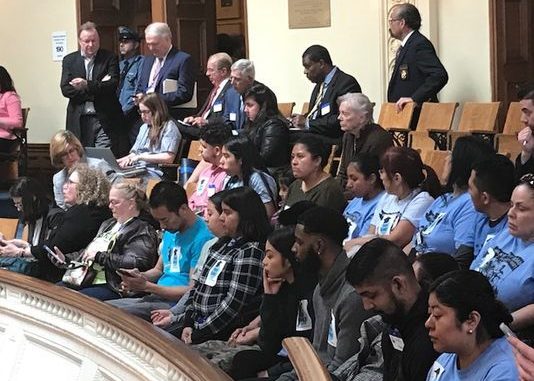
HARTFORD – Students without legal immigrant status stand on the verge of finally becoming eligible for tuition-supported financial aid after a landmark House vote on Wednesday. Undocumented students and their advocates celebrated in the House gallery following the final 91-59…
A number of DACA Dreamers begin a 240-mile walk from New York to Washington D.C on their quest to get a permanent legislative fix for Dreamers. Marko Georgiev/NorthJersey.com
Widget not in any sidebars
The Assembly on Thursday overwhelmingly approved a measure to extend in-state college financial aid to undocumented students starting in the fall.
The bill, which the Assembly approved 49-24, largely along party lines, was approved by the Senate last month. It now goes to Gov. Phil Murphy, who said during his campaign last year that he would support a measure to extend in-state financial aid to Dreamers, the term used for undocumented immigrants who were brought to the United States as children.
Murphy has not indicated whether he plans to sign the bill into law. In a brief statement issued before the vote, his office said the governor “does not comment on specific or pending legislation until it reaches his desk for signature.”
If Murphy signs the bill, New Jersey would join California, Oregon, Washington, Texas, Oklahoma, Minnesota, New Mexico and Hawaii, all of which already make state financial aid available to undocumented students.
Only one Democrat, Joe Danielsen of Middlesex County, voted against the bill on Thursday. The vote drew about two dozen supporters of the bill to the Statehouse in Trenton, and they cheered after the measure was approved.
The legislation extends financial aid administered by the Higher Education Student Assistance Authority or the Office of the Secretary of Higher Education to undocumented students in New Jersey who are living in the country illegally, as long as they meet certain requirements.
More: ICE deports Clifton father to Albania; his wife and son are detained
More: New Jersey joins coalition challenging Trump’s third travel ban
For Madelyne Montes-Reyes, 22, of Morristown, Murphy’s signature on the bill would mean that she could start planning to return to Montclair State University. She took a break in her studies toward a psychology degree last year because she couldn’t afford the tuition.
“I wasn’t sure which way it was going to go,” she said. “It was just very emotional. … It’s
great to see we do have support.”
Critics of extending financial aid to undocumented immigrants have said it is not economically feasible, and that any money available to help students pay for college should go to those who are living in the country legally.
Assemblyman Jay Webber, R-Morris Plains, noted that the governor had said he wanted to raise taxes by $1.7 billion to make ends meet and that the state can’t pay its bills already.
“He wants to raise our income tax, our sales tax, tax for businesses,” Webber said. “He tells us that we are broke and he needs more of our money, and then new proposals to spend our money come forward. … Take, take, take, spend, spend spend — there has to be an end to it. “
How much will it cost?
In a fiscal analysis of the Senate bill, the Office of Legislative Services estimated that the state would have to appropriate an additional $4.47 million to provide Tuition Aid Grants to 600 newly eligible students. The report noted that the state set aside $425.9 million for the grants in the current fiscal year.
Schaer said the additional cost represents a little more than 1 percent of the money set aside for the tuition grants. Expanding access to tuition assistance, he said, would pay dividends for the state by boosting the number of students who complete college, allowing them to earn more money and contribute more in state taxes.
“These children have had to school themselves against unbelievable odds, and yet they were successful and they were hardened by their experience,” he said before moving the bill for a vote. “And one could assume that the success that they have had to date will grant them that same success in the future.”
Assemblyman Jon M. Bramnick, R-Union, the minority leader, asked that the bill be sent back for a second reading for an amendment, saying that a “common-sense suggestion” would be to add that families seeking financial aid must demonstrate that they have paid taxes for a period of time.
“It does not necessarily discriminate against people, but what it does: It encourages people to pay their taxes,” he said.
The back and forth, and the vote to table, led some Dreamers and their supporters to fear that the measure might not pass.
“Hearing the opposition, knowing that there are, in fact, people who don’t think people like us should get a chance for this financial aid pool, I know was emotional for people I was sitting next to,” said Sara Mora of Hillside, who said financial aid would allow her to attend a four-year college. “But it was really empowering to be able to stand there and see it pass. It gives us a lot of hope to keep going.”
According to the OLS fiscal analysis, nearly 600 students qualified for in-state tuition at a four-year college in fall 2015 under New Jersey’s Dream Act of 2013, which allows eligible undocumented immigrants to pay in-state tuition at colleges and universities. Gov. Chris Christie vetoed the part of the bill that would have also given those students access to state financial aid.
Widget not in any sidebars
Erika Nava, a policy analyst for New Jersey Policy Perspective, a left-leaning research group, said a few hundred students would probably apply the first year, with that number growing as the law becomes more widely known. In California, where financial aid became available to undocumented immigrants in 2011, applications lagged this year, possibly because of fear of immigration enforcement, until there was a publicity push, she said.
“Many factors are going to play into how many people are going to apply,” she said.
New Jersey is home to 17,400 Dreamers who benefit from an Obama-era federal program known as Deferred Action for Childhood Arrivals that provides two-year renewable work permits and Social Security numbers to young undocumented immigrants who were brought to the United States as children. Although the program, known as DACA, does not provide legal status, it does protect Dreamers from deportation.
President Donald Trump’s administration rescinded DACA, but two federal judges have since blocked the administration from ending the program. DACA recipients can still renew their two-year work permits, but younger immigrants are no longer able to apply as they reach the age of 15.
DACA recipients will be among those who could qualify for financial aid under the state bill.
“This is a really important first step for New Jersey to stand up and defend immigrants, defend Dreamers,” said Sara Cullinane of Make the Road New Jersey, who attended the Assembly vote with dozens of others from her organization and the Wind of the Spirit in Morristown. “Immigrant young people have been experiencing horrible attacks from the federal government, and this is one way New Jersey can step up and make sure they get equal access to education.”
Who would be eligible?
To be eligible for financial aid under the bill, applicants must demonstrate financial need by submitting their parents’ income tax information.
They must also have attended high school in New Jersey for three or more years, have graduated from a New Jersey high school or received the equivalent of a high school diploma, and be enrolled in a college in the state.
Undocumented students must also file an affidavit with their college, stating they will file an application to legalize their immigration status or will file an application as soon as they are eligible to do so.
Among the students who say they could be eligible for financial assistance under the bill is Monserrath Campos, 24, of Paterson. She said it has taken her longer than she planned to complete her studies at Passaic County Community College because her mother lost her job. Campos, who graduated from high school in 2012, wants one day to enroll at Montclair State University.
“I think getting financial aid will accelerate the process of going to a four-year college,” she said. “That’s the main goal. It’s just taking a little longer.”
Gloria Rodriguez, 21, who was born in Mexico and currently attends Essex County College, said access to financial aid would help her next year when she hopes to enroll at New Jersey City University. Rodriguez, who said she will likely pursue a degree in teaching special education, has scholarships that cover her full tuition at Essex County College.
“Having financial aid would not only help me do better in school, but it will benefit me because it would allow me to just focus on school,” she said.
Rodriguez said her younger brother, Nestor, 17, who will start college in the fall, was offered a soccer scholarship that would cover some of the tuition at his top-choice school, the College of St. Elizabeth in Morristown. However, because he currently is not eligible for financial aid as an undocumented student, he probably will have to start his college career at a different school, she said.
“Basically, if he had financial aid, and with what the scholarship is giving him, then he could go there for free, but because he doesn’t qualify for financial aid, I just don’t think he will have an opportunity to go to that college, which was his No. 1 choice,’’ she said.







Be the first to comment